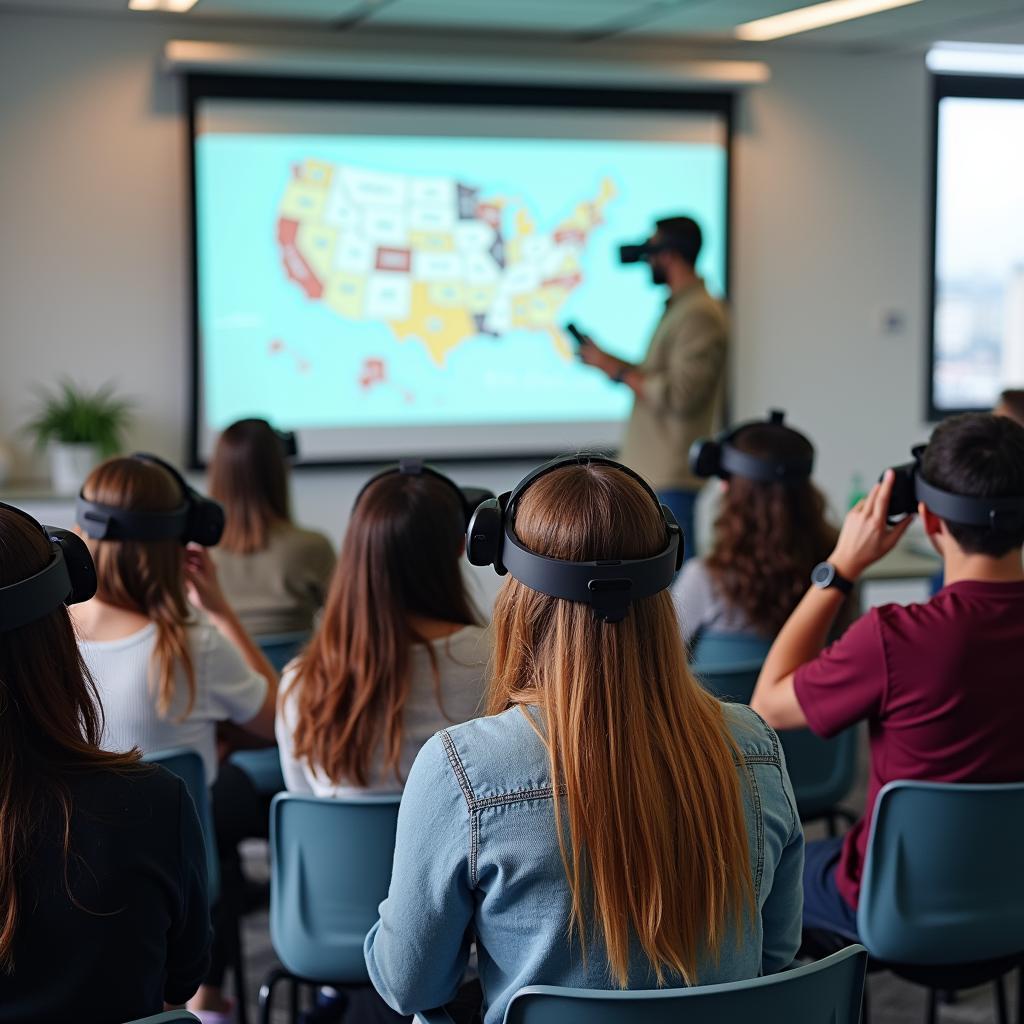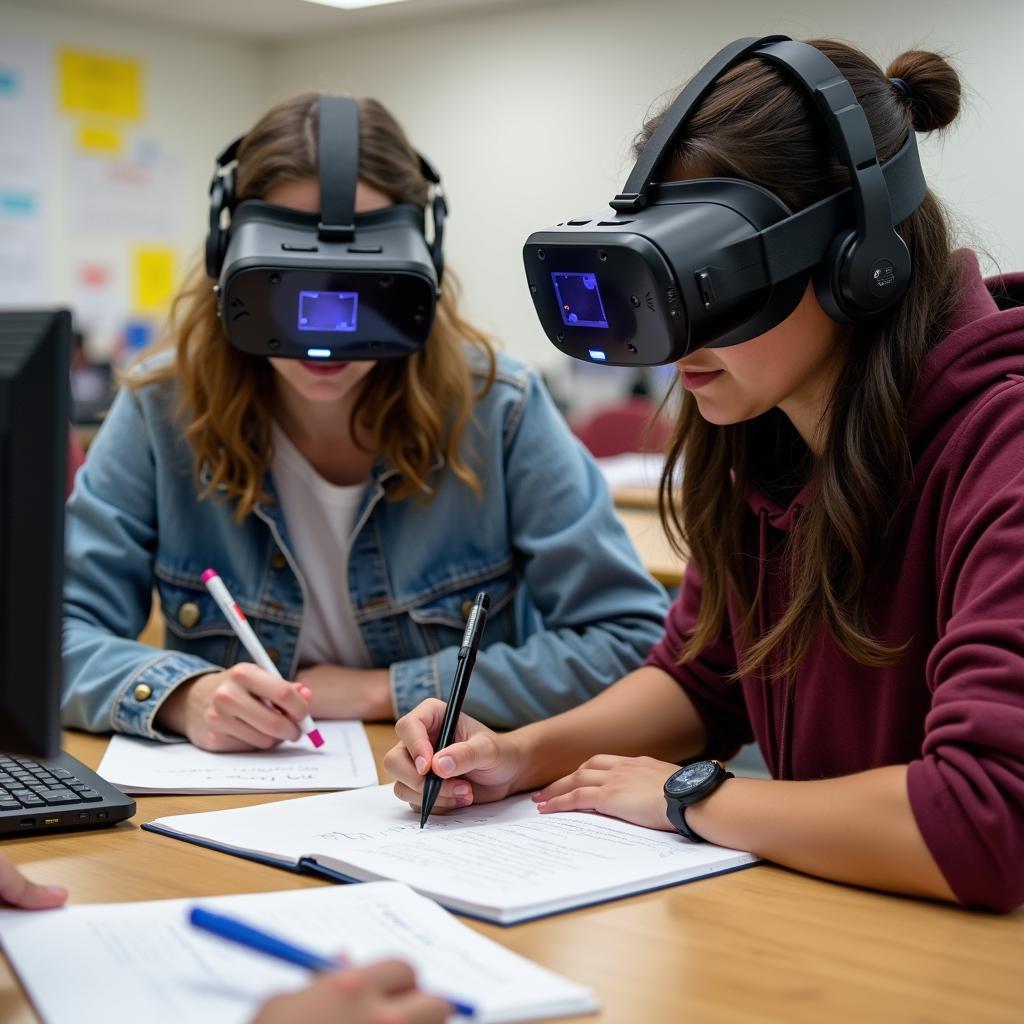Virtual reality (VR) in education has become an increasingly popular topic in IELTS Writing Task 2, particularly as technology continues to reshape learning environments. Similar to how digital learning platforms change access to education, this subject frequently appears in technology and education-themed questions.
Some people believe that virtual reality technology will revolutionize the way students learn in schools and universities. To what extent do you agree or disagree with this statement?
Analysis of the Question
This question requires candidates to express their opinion about VR’s impact on education. The key task is to evaluate the extent of agreement/disagreement and provide well-supported arguments.
 Virtual reality transforming traditional classroom learning experience
Virtual reality transforming traditional classroom learning experience
Sample Essay 1 (Band 8.5)
The integration of virtual reality into educational settings has generated considerable debate regarding its potential to transform traditional learning methods. While I strongly agree that VR technology will fundamentally change education, its revolutionary impact will depend on proper implementation and accessibility.
VR technology offers unprecedented opportunities for experiential learning that were previously impossible in conventional classrooms. Students can now virtually visit historical sites, explore the human body’s internal systems, or conduct dangerous scientific experiments safely. For instance, medical students can practice complex surgical procedures without risk, while geography students can explore distant ecosystems without leaving their classroom. This immersive approach to learning, as discussed in Augmented reality: potential uses, significantly enhances understanding and retention of complex concepts.
Furthermore, VR creates engaging and interactive learning environments that cater to different learning styles. Visual learners can benefit from 3D demonstrations, kinesthetic learners can interact with virtual objects, and auditory learners can engage with spatial audio experiences. This versatility in teaching methods ensures that educational content becomes more accessible and memorable for diverse student populations.
However, the revolutionary potential of VR in education faces certain limitations. The primary challenge lies in the substantial cost of implementing VR systems across educational institutions, particularly in developing regions. Additionally, technical issues and the need for specialized training for educators could initially hinder seamless integration into existing curricula.
In conclusion, while VR technology holds immense potential to revolutionize education through immersive and personalized learning experiences, its success will largely depend on overcoming practical implementation challenges. The transformation will likely be gradual rather than immediate, but the impact on educational outcomes could indeed be revolutionary.
 Students actively engaging with virtual reality educational content
Students actively engaging with virtual reality educational content
Sample Essay 2 (Band 6.5)
I agree that virtual reality will change education a lot. This technology has many benefits for students and teachers, making learning more interesting and effective.
Firstly, VR helps students learn better because they can see and experience things directly. For example, when studying history, students can visit ancient places virtually. This is better than just reading books or looking at pictures. Also, science students can do experiments safely in virtual labs.
Another good point is that VR makes learning more fun. Students enjoy using new technology, and this makes them more interested in their studies. When students are interested, they learn better and remember more. This is similar to how does technology affect the quality of education.
However, there are some problems with using VR in schools. The equipment is expensive, and not all schools can afford it. Also, some teachers might find it difficult to use this new technology. They need training to use VR properly in their classes.
In conclusion, I think VR will make big changes in education, but it will take time. Schools need money and training to use this technology well. When these problems are solved, VR will help students learn better.
Key Vocabulary
- Experiential learning (n) /ɪkˌspɪriˈɛnʃəl/ – Learning through direct experience
- Immersive (adj) /ɪˈmɜːsɪv/ – Providing complete involvement in something
- Integration (n) /ˌɪntɪˈɡreɪʃn/ – The process of combining things effectively
- Implementation (n) /ˌɪmplɪmɛnˈteɪʃn/ – The process of putting a plan into action
- Curricula (n) /kəˈrɪkjʊlə/ – The subjects comprising a course of study
- Revolutionary (adj) /ˌrɛvəˈluːʃənri/ – Involving complete or dramatic change
- Versatility (n) /ˌvɜːsəˈtɪlɪti/ – Ability to adapt or be adapted to many functions
Practice Exercise
Try writing your own essay on this topic, focusing on specific examples of how VR could transform different subject areas. Share your essay in the comments for feedback and discussion.


